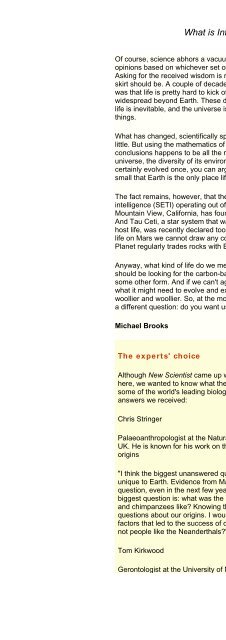07.+What+is+Intelligence+(February+2006) - Get a Free Blog
07.+What+is+Intelligence+(February+2006) - Get a Free Blog
07.+What+is+Intelligence+(February+2006) - Get a Free Blog
Create successful ePaper yourself
Turn your PDF publications into a flip-book with our unique Google optimized e-Paper software.
What is Intelligence? 134<br />
Of course, science abhors a vacuum, and so scientists have formed<br />
opinions based on whichever set of proofs they like the sound of.<br />
Asking for the received wisdom is rather like asking what length a<br />
skirt should be. A couple of decades ago, the fashionable opinion<br />
was that life is pretty hard to kick off, and thus probably not<br />
widespread beyond Earth. These days it is more in vogue to say that<br />
life is inevitable, and the universe is probably crawling with living<br />
things.<br />
What has changed, scientifically speaking, in those 20 years? Very<br />
little. But using the mathematics of probability to reach your<br />
conclusions happens to be all the rage. Given the vastness of the<br />
universe, the diversity of its environments, and the fact that life has<br />
certainly evolved once, you can argue that the chances are pretty<br />
small that Earth is the only place life exists.<br />
The fact remains, however, that the search for extraterrestrial<br />
intelligence (SETI) operating out of the SETI Institute headquarters in<br />
Mountain View, California, has found nothing conclusive in 40 years.<br />
And Tau Ceti, a star system that was considered a frontrunner to<br />
host life, was recently declared too comet-ridden. Even if we discover<br />
life on Mars we cannot draw any conclusions because the Red<br />
Planet regularly trades rocks with Earth.<br />
Anyway, what kind of life do we mean? We don't know whether we<br />
should be looking for the carbon-based life so familiar on Earth, or<br />
some other form. And if we can't agree on a definition of life, and<br />
what it might need to evolve and exist, the argument just gets<br />
woollier and woollier. So, at the moment, it all seems to boil down to<br />
a different question: do you want us to be alone?<br />
Michael Brooks<br />
The experts' choice<br />
Although New Scientist came up with the 10 questions presented<br />
here, we wanted to know what the experts think. So we canvassed<br />
some of the world's leading biologists. Here is a selection of the<br />
answers we received:<br />
Chris Stringer<br />
Palaeoanthropologist at the Natural History Museum in London,<br />
UK. He is known for his work on the "Out of Africa" theory of human<br />
origins<br />
"I think the biggest unanswered question in biology is whether life is<br />
unique to Earth. Evidence from Mars may help to answer this<br />
question, even in the next few years. As for my own field, I think the<br />
biggest question is: what was the last common ancestor of humans<br />
and chimpanzees like? Knowing the answer would help solve many<br />
questions about our origins. I would also like to discover the key<br />
factors that led to the success of our species. Why are we here and<br />
not people like the Neanderthals?"<br />
Tom Kirkwood<br />
Gerontologist at the University of Newcastle upon Tyne, UK. He


